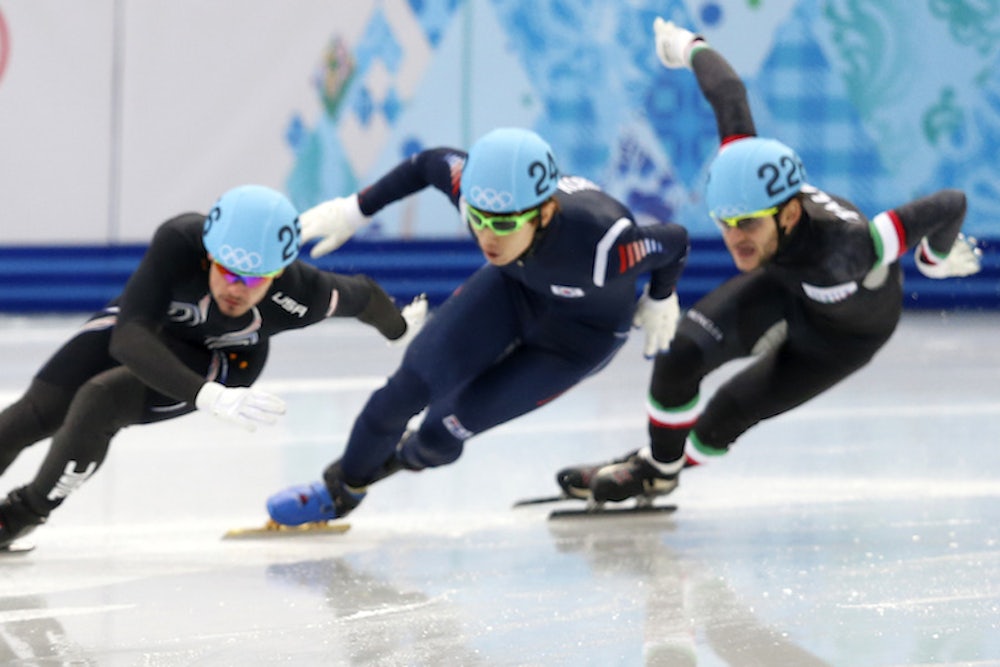Team China won its first medal at the Sochi Olympics last week, when skater Han Tianyu took the silver in the mens's short-track 1500 meters. China's medal count has since climbed to six, with three golds, two silvers, and one bronze. Not terrible: they're currently ranked 10th in the standings, just behind Poland and ahead of Sweden. But it's nothing like their domination at the 2008 and 2012 Summer Olympics, and it's a slide from their final 7th-place ranking in Vancouver in 2010. China's state-sponsored sports system is notoriously adept at producing top athletes in everything from swimming to weight-lifting to table tennis. Why is ice apparently China's kryptonite?
Winter sports just aren't that big in China. First off, there's not much snow. It only snows regularly in the far north, which hasn't traditionally been a vacation destination. Attempts to lure would-be skiers to massive resorts have had mixed results; a lot of Chinese first-timers are also last-timers. China's official holiday schedule doesn't encourage slope-hitting, either. During the only long winter holiday, Chinese New Year, people typically return to their home towns to see their families, usually in snowless locales. Factor in the perception of winter sports as dangerous—they do involve traveling across slippery surfaces at high speeds, after all—and most Chinese avoid them altogether.
China's government-run sports system doesn't favor winter sports. Provincial governments are expected to pick the best athletes at the local level and funnel them up to the central sports academies. But winter sports facilities are expensive, and local governments don't get enough financial help from the central government to make the investment worth it, according to Xu Guoqi, professor of history at The University of Hong Kong and author of Olympic Dreams: China and Sports, 1895-2008. And unlike northern Europe, where many winter sports athletes can practice year round, northern China is only cold during the wintertime. As a result, China tends to excel at ice-based sports like speedskating (and, now, curling), since rinks can be maintained all four seasons, whereas skiing facilities only operate several months out of the year.
The Chinese government doesn't care about the Winter Olympics. The Olympics are always about politics, especially for China. In 1952, the PRC's participation in the Helsinki Summer Olympics was seen as a political victory over Taiwan, which pulled out in protest; China's decision to join the 1980 Winter Olympics reaffirmed its new, post-1979 opening-up policy. But right now, the Winter Olympics doesn't have the same symbolic clout as its summer counterpart. It's smaller, with 98 events at the Sochi Games compared to 302 events at the Summer Games in 2012. Plus, whereas the United States long dominated the Summer Olympics, topping the medal count from 1992 to 2004, the Winter Olympics title shifts among a few top countries, including Canada, Norway, and Germany. And China isn't especially concerned about crushing Norway. (Well, maybe sometimes.) This year, the biggest diplomatic benefit for China was the chance for President Xi Jinping to publicly bro down with Vladimir Putin.
Like everything in China, this is all about to change. The PRC has entered a bid for the 2022 Olympics that would be held jointly in Beijing and Zhangjiakou, a city about 110 miles north-west of the capital. Right now, Zhangjiakou doesn't look like much. Aesthetically it's a generic Chinese third-tier city, and many of the roads to the mountains were only recently paved. This winter has been so dry that the slopes I encountered a few weeks ago were sheets of icy, nearly unskiable snow.
No one realistically expects the 2022 bid to succeed, since the 2018 Games will be held just next door in Seoul. But China may have a shot for 2026. As Sochi has proven, lack of snow is not a deal-breaker. And the Zhangjiakou area is developing fast, with a handful of new ski resorts in the works and a high-speed rail line that will reduce travel time from Beijing to Zhangjiakou to 40 minutes. Plus, the economic benefits of boosting winter sports in China may prove too good to refuse, for everyone from the skiing industry to sporting goods brands to the Olympics Committee itself. There are currently about 5 million Chinese skiers, says Justin Downes, president of Axis Leisure Management in Beijing. By 2026, that number will be a lot bigger, especially if China has an Olympics to prepare for.
If the 2008 Beijing Olympics symbolized China's reentry into the global race, its ability to run with the pack, the 2026 Winter Games will confirm its perch among the elites, sipping a bellini in the hot tub during the apres-ski.
